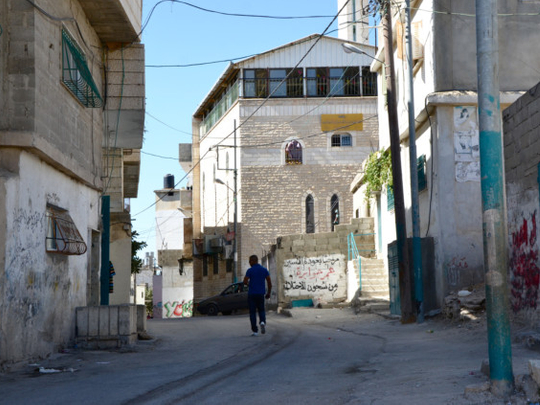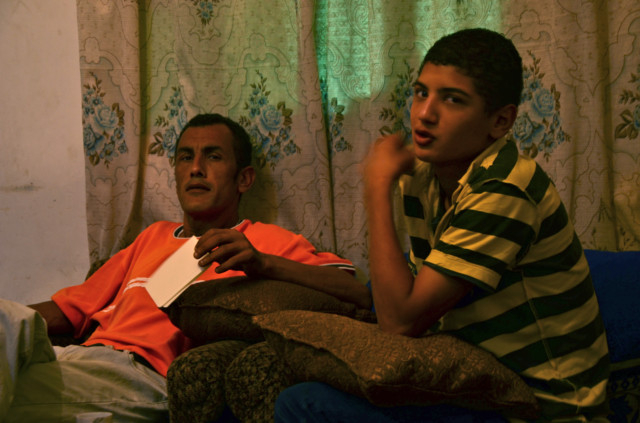
Ehab Yasser Mohammad was only 15 when about 30 Israeli soldiers arrived at his house in the refugee camp Al Arrub to arrest him for something he did not do.
According to his father, Yasser Abu Ehab, they banged on their door at about 3am. After several minutes of banging, the father answered the door just as they were getting ready to throw an explosive to open it.
“When I asked what they were doing knocking down the door at 3am, the soldiers responded by saying, ‘You can’t ask the Israeli army what we are doing. You are under occupation and we can do whatever we want,’” Abu Ehab said.
Abu Ehab was asked to gather all the children in the living room. “When Bashar (his 12-year-old son) saw the soldiers, he wetted himself. It was a terrifying experience for the children,” he said. The soldiers asked for Yasser Mohammad, his oldest son. Completely unaware of what was happening or what he was accused of, Yasser Mohammad was handcuffed and put into a military vehicle, where he was kicked and punched, before being delivered to an interrogator.
“While I was in the jeep they beat my head against the jeep and beat me with the butt of their gun. While they were beating me they were talking and singing,” Yasser Mohammad recalled.
“I heard the screaming of my child. It was heartbreaking,” Abu Ehab added, lowering his tone at the painful memory.
Yasser Mohammad was taken to a detention centre where the interrogator told him to confess to crimes of stone-throwing and being part of a party, something which he denied as he spent most of his time working in a hotel in Bethlehem. He was told if he did not confess, he would be sent back to the soldiers that had just beaten him up. Terrified, he “confessed”.
“The interrogator called and said my son had confessed to throwing a stone and participating in a March. I asked him when and he said April 4 or 5 and I said it is impossible since he was in Bethlehem and I could show the proof. The interrogator said not to make it difficult: Yasser Mohammad had already confessed, so it would be the easiest if he just apologised and the judge released him,” Abu Ehab explained.
After the trial, Yasser Mohammad was sentenced to 18 days in jail and fined 1,500 shekels (Dh1,546). While the West Bank celebrated Eid Al Fitr, Yasser Mohammad spent the holiday in prison cut off from his family.
Child prisoners
According to the NGO Defence for Children International (DCI), every year between 500 to 700 Palestinian children, some as young as 12, are detained and prosecuted in the Israeli military court system. As of July 31, 195 Palestinian children were in prison.
Most children have been convicted of “stone-throwing”. In extreme cases this can carry a 20-year sentence, but they often spend between three to six months in prison. Other common arrests are for being a member of an outlawed party or throwing explosive devices such as Molotov cocktails.
In June, the UN Committee on the Rights of the Child expressed its “deepest concern about the reported practice of torture and ill treatment of Palestinian children arrested, prosecuted and detained by the Israeli army and the police”.
The committee stated that the youth are usually arrested during nighttime raids, handcuffed and sometimes physically abused and transported to detention centres to be interrogated while their parents are kept in the dark about their whereabouts.
According to testimonies of 311 children collected by DCI, the journey to the interrogation centre is routinely accompanied by further ill treatment. While cases vary with each arrest, children have reported physical and verbal abuse, death threats and in some cases sexual assault.
“These crimes are perpetrated from the time of arrest, during transfer and interrogation, to obtain a confession but also on an arbitrary basis as testified by several Israeli soldiers as well as during pretrial detention,” the committee said.
None of the 311 children was accompanied by a lawyer during their interrogation and only two were accompanied by a parent.
Many similar cases
Many others would find Yasser Mohammad’s story familiar, especially those in Palestinian villages or refugee camps such as Gush Etzion, Karmi Zur and Beit Ummar, which are located near Israeli colonies or along roads that the colonies use. They are often subjected to raids. During 2013, Israeli soldiers entered Beit Ummar 35 times arresting 17 people, including seven children, according to DCI-Palestine.
“The issue of child arrests is related to of security. When there is a tense security situation, the number of arrests goes up. The biggest was between 2002 and 2003 [the Second Intifada],” said Ayed Abu Eqtaish, accountability programme director at DCI–Palestine.
On January 14, 2013, 15-year-old Salah was arrested by Israeli soldiers near the village of Qalqiliya. He was looking for sage plants in the small forest near his village when four Israeli soldiers accused him of having thrown stones. Salah denied this. Salah’s hands were then tied tightly behind his back with a plastic cord and brought to a military jeep. Israeli soldiers inside the jeep verbally abused Salah. After the jeep stopped, “they pulled me out and made me walk for about ten minutes, with one of them kicking me from behind. I was kept tied and blindfolded. I fell twice,” Salah said.
At Ariel police station, the Israelis interrogated Salah without informing him of his rights and ordered him to sign a statement written in Arabic without explaining it to him.
In March 2013, 16-year-old Mohammad K. was arrested from his house at 5am and accused of throwing stones. He was placed in solitary confinement for several days and subjected to multiple interrogation sessions involving threats and physical violence. “I was in bad shape and hurting, so I decided to ‘confess’ to everything to get myself out of the cell and put an end to this humiliation,” he said.
This pattern of abuse was also revealed when more than 30 former Israeli soldiers disclosed their experiences in a booklet of testimonies published by Breaking the Silence, an organisation of former Israeli soldiers dedicated to publicising the day-to-day actions of the army in the occupied territories.
One former soldier describes serving in Hebron in 2010: “There are those annoying moments when you’re on an arrest mission, and there’s no room in the police station, so you just take the child back with you, blindfold him, put him in a room and wait for the police to come and pick him up in the morning. He sits there like a dog …”
Legal amendments
The Israeli military detention system consists of a network of military bases, interrogation and detention centres, and police stations across the West Bank, occupied East Jerusalem and in Israel. Any Palestinian arrested in the West Bank is tried in one of the two Israeli military courts.
A military juvenile court was established in September 2009, following mounting criticism relating to the prosecution of children as young as 12 in the same military courts used to prosecute adults. Under the new provisions, children should be tried separately from adults in the military juvenile court and after conviction and before sentencing, the court should prepare a social welfare report of the child’s circumstances.
However, these new provisions relating the preparation of social welfare reports are almost never invoked. According to a recent report published by the Israeli organisation No Legal Frontiers, “The establishment of the military juvenile court brought about only a marginal change in the legal proceedings against Palestinian minors in the West Bank. The amendment of military law that led to the establishment of the military juvenile court had no effect at all on the interrogation and arrest procedure which are critical stages that dictate the outcome of the whole legal process.”
A visit to the Ofer Military Court reveals a demeaning environment for both the arrested children and the visiting families. Families arriving to see their children in court are made to go through a series of waiting rooms that are hemmed in by metal fencing. This is, in almost all cases, where they see their child for the first time after the arrest. In court, the minors are brought in groups of three or four, handcuffed to each other and their feet bound together.
Volunteers for No Legal Frontiers observed the trials of Palestinian minors in the military juvenile court in Ofer Camp between April 2010 and March 2011. According to them, the vast majority of files were based on the defendants’ confessions given during police interrogations and on incrimination by boys of similar ages growing up in similar circumstances. However this form of evidence is problematic. Under Israel’s laws, the confession of a defendant given to the police under duress is not admissible as evidence. Also, violation of a defendant’s rights in the interrogation stage can lead to disqualification of a confession: the testimony of a witness not given of their free will, or given under duress or involving denial of rights, may be rejected by the court or given only little weight.
In no case was there a trial within a trial on the admissibility of the confessions, even though in some of the cases serious allegations of similar nature were made about the interrogation: night arrests and night interrogations, beatings, threats, and extreme violations of the suspects’ right to consult lawyers and to remain silent.
At least 90 per cent plead guilty as this is the quickest way out of a system that denies children bail in 87 per cent of cases.
“The reason why there is such a high percentage of those found guilty is because children confess to crimes during interrogation whether they have done them or not. The role of the court is not to argue how the evidence was collected. The role of the court is that they have the evidence. If lawyers want to prove that these confessions were extracted by force and that the children are innocent and did not commit these offences, it takes a lot of time. The quickest way out of the system is for the defence lawyer and the prosecutor to reach a bargain by agreeing on a sentence, and to do that, the accused has to plead guilty,” Eqtaish said.
Once convicted, the children face time in prison where in many cases they do no see their family until they are released.
“For their family to visit, they should have a permit which is coordinated through the Red Cross that sometimes takes 2 to 3 months and in some cases is refused for security reasons without clarifying what the security reason is,” Eqtaish said.
Life after arrest
The ordeal doesn’t end once the children are released from prison. A month after his arrest and imprisonment, Yasser Mohammad sits in his living room surrounded by his family and neighbours. His father has to pay the medical bills of treatment for the injuries sustained during his arrest. During his time in prison Yasser Mohammad also lost his job; it will be difficult to find one again in the West Bank. And there is the psychological impact: he still has nightmares about men in uniform raiding his house in the middle of the night.
“I believe that everybody who passes through this system will be psychologically affected,” Eqtaish. Once arrested, this is something that a child carries as a burden for many years to come, which is why the arrest, interrogation and imprisonment of juveniles (if needed) should be treated with a lot more care and sensitivity.
Based in Manila, Aya Lowe writes business, travel and human interest stories around South East Asia and the Middle East.












